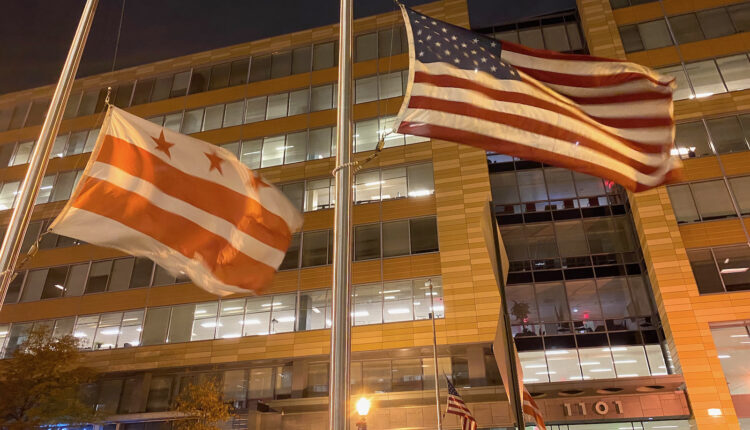
jonetta rose barras: DC’s finance chief hasn’t conducted quality oversight and fiscal management
When DC Inspector General Daniel W. Lucas and his team released a report in September that indicated the DC Department of Housing and Community Development (DHCD) had misspent $82 million from the Housing Production Trust Fund, advocates were apoplectic. The IG’s findings were not new, however. DC Auditor Kathy Patterson has made similar discoveries of mismanagement of the fund and associated programs.
In each instance, housing advocates and the media pointed the all-accusing finger at the agency and its director Polly Donaldson, who retired Sept. 30— thank goodness. While she was guilty of many missteps, which I listed on a regular basis, Donaldson does not bear the sole blame for the agency’s fiscal problems.

In a summary report to DC Council Chairman Phil Mendelson dated Nov. 23 but only publicly released on Dec. 3, Patterson has made it clear that all roads to mismanagement of public funds ultimately lead to the Office of the Chief Financial Officer. More specifically, the chief financial officer (CFO). Fitzroy Lee has been serving as acting CFO since Jeffrey DeWitt’s departure early this year.
Patterson said she and her staff prepared the letter, which summarizes several years of findings and recommendations, with the knowledge that the mayor is considering now who she will nominate for the permanent job of CFO. Patterson said she hopes officials will evaluate the concerns before making a final choice.
She noted that over a six-year period — FY 2015 through FY 2020 — her office released “more than 100 reports, including audits, revenue certifications, and program evaluations.” The findings consistently pointed to “a wide range of issues, from weak or missing standard operating procedures to a lack of compliance with regulations and laws.”
The new report also identified “accounting irregularities, inefficient and wasteful spending, and poor recordkeeping.” Patterson said the findings have been “similar from report to report as we find familiar shortcomings in operations throughout the District government.”
In other words, there is a systemic fiscal management problem in the city. That should concern everyone in DC — from elected officials to taxpayers, many of whom undoubtedly believe that their hard-earned cash will be used to operate an effective and efficient government.
Forgetaboutit.
While federal allocations have aided the District since FY 2020, the status of the city’s fiscal health remains questionable as the pandemic lingers. There are legitimate concerns about what happens when the COVID-19 relief funds dry up. Will the DC government have the capacity to continue the level of spending approved in recent years? In FY 2022, which began Oct. 1, the budget is a whopping $18 billion for a population of about 700,000 people.
“I am concerned that there’s not more rigorous oversight of how our federal dollars are being spent,” Patterson told me during an interview earlier this week. She characterized the CFO’s office as “not a tight ship.”
Interestingly, Mayor Muriel Bowser this week asked the council to restore the executive’s ability to procure and contract for myriad items without the usual restrictions, as had been allowed during the public health emergency. When the council ended that emergency procurement authority as of Nov. 5, the city’s previously established rules and regulations went back into effect. “This authority is critical to DC Health being able to immediately respond to any potential surge in cases and prepare for an enhanced posture for increased COVID-19 testing,” among other things, Bowser said in a prepared statement.
Mendelson didn’t reply to my email requesting a comment about the auditor’s letter. Council Chair Pro Tempore Kenyan McDuffie, who chairs the Committee on Business and Economic Development with oversight of the CFO, did not reply to a request via email for a response to the audit letter. A spokesperson for the CFO said the office had responded to the audit letter. Technically, perhaps; the document merely indicates some cases where the CFO took action.
In the mid-1990s, the city was snatched back from virtual bankruptcy by then-President Bill Clinton and Congress with the creation of a financial control board. A critical feature of that rescue package involved the establishment of an independent CFO, with a protective tenure of five years. As Patterson noted in her letter, the “CFO is required to maintain systems of accounting and internal control designed to provide effective control over, and accountability for, all funds, property, and other assets of the District of Columbia.”
“Given the financial management challenges faced by District agencies and programs as evidenced by the findings summarized in this report, the [OCFO] is in a unique position to assert its independence and authority and leverage its expertise in providing objective advice through its cadre of Agency Fiscal Officers to improve the quality of financial management, transparency, and accountability in District agencies’ operations and programs,” continued Patterson.
Though armed with independence and authority, the OCFO has repeatedly failed to flex its muscle. Anthony A. Williams, who was hired as the first finance chief in 1995, may have been the exception. His successors have generally done the bare minimum to protect against fiscal mismanagement and malfeasance.
Consider, for example, acting CFO Lee’s written responses to the questions McDuffie posed earlier this year in preparation for budget performance oversight hearings: “What 25 critical programs will be benchmarked in the FY22 budget and financial plan?”
Lee said his office “defers to the Executive in determining these [spending] benchmarks.”
McDuffie went on to ask him to “describe the OCFO’s role in development of the Executive’s performance measures for subordinate agencies.”
Once again, Lee said he “defers to the Executive.”
That suggests as the budget is being developed, the OCFO — the office with ultimate budget and fiscal authority — sits on the sidelines on many key questions. Meanwhile, this year, Lee and his crew will rake in $203,057,803 of the public’s money — the OCFO’s budget for FY 2022 — for seemingly doing next to nothing in terms of needed financial oversight and control of agencies under the executive.
The misspending by the DHCD highlighted in the OIG’s September report included the agency permitting developers to exceed their approved budgets to the tune of $14.2 million, as well as $10 million in uncollected loan payments. That money surely could have been used to actually build affordable housing.
Patterson’s letter tracks the misspending: The OCFO seemed not to regret enabling DHCD to mismanage $16.6 million in federal housing grant funds. The finance chief and his team allowed at least $38 million to be misspent on school modernization projects over a period of several years
In fairness, it appears the OCFO has implemented some past recommendations made by the auditor. However, in many other cases, the CFO has taken a more cavalier approach.
For example, the auditor had recommended the finance chief implement a process that would prevent buildup of revenue year after year in special purpose accounts that don’t get spent by certain agencies. According to the audit letter, the CFO indicated that the recommendation “will not be implemented; management accepts risk.”
That seems like an audacious statement, especially when considered against this fact: It really isn’t the CFO’s money at risk. It’s the public’s money.
jonetta rose barras is an author and freelance journalist, covering national and local issues including politics, childhood trauma, public education, economic development and urban public policies. She can be reached at thebarrasreport@gmail.com.


Comments are closed.